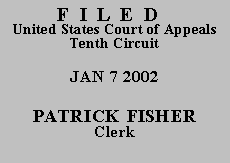

| ROBERT ROSS, |
|
| v. | |
| RON LYTLE, Warden, Central New Mexico Correctional Facility, and the ATTORNEY GENERAL FOR THE STATE OF NEW MEXICO, |
I. BACKGROUND
Robert Ross, a state prisoner proceeding pro se, seeks a certificate of appealability ("COA") so that he can appeal the district court's denial of his 28 U.S.C. § 2254 habeas corpus petition. See 28 U.S.C. § 2253(c)(1)(A) (providing that no appeal may be taken from the denial of a § 2254 habeas petition unless the petitioner first obtains a COA). Because Mr. Ross has not "made a substantial showing of the denial of a constitutional right," this court denies his request for a COA and dismisses this appeal. 28 U.S.C. § 2253(c)(2).
In New Mexico district court, Mr. Ross pleaded nolo contendere to solicitation to distribute cocaine and trafficking of cocaine. Under the terms of the plea agreement, the State agreed to:
order the defendant's incarceration to be transferred to the State of North Carolina, provided that New Mexico and North Carolina have an agreement regarding the reciprocal exchange of prisoners. The parties understand that the defendant shall then be subject to the laws and regulations governing the North Carolina Department of Corrections. In the event that such a reciprocal prisoner exchange agreement does not exist, the defendant's incarceration shall be transferred to a state facility where the in-custody population contains a significant portion of African-Americans.
Rec. vol. I, doc. 9, Ex. C ¶ 5 (Repeat Offender Plea and Disposition Agreement, dated Mar. 23, 1999). Mr. Ross also waived his right to appeal by entering the plea agreement.
Mr. Ross was subsequently sentenced to eighteen years' imprisonment to run concurrently with his sentence for another offense. The judgment also included the North Carolina "transfer" language as provided in the plea agreement.
In his § 2254 petition before the district court, Mr. Ross contended that (1) he involuntarily entered the plea agreement, (2) his counsel provided him ineffective assistance, and (3) he suffered cruel and unusual punishment because he was "sentence[d] . . . to a Negro prison because [he is] Negro." Rec. doc. 1, at XI (application for a writ of habeas corpus, filed Dec. 7, 2000). Each of these claims was addressed by the state court during post-conviction proceedings. The district court adopted the findings of a magistrate judge and dismissed Mr. Ross' claims. We agree, and hold that none of Mr. Ross' claims demonstrate a "substantial showing of the denial of a constitutional right," 28 U.S.C. § 2253(c)(2); thus we deny Mr. Ross' request for a COA.
II. DISCUSSION
To obtain a COA, Mr. Ross must establish that "reasonable jurists could debate whether (or, for that matter, agree that) the petition should have been resolved in a different manner or that the issues presented were adequate to deserve encouragement to proceed further." Slack v. McDaniel, 529 U.S. 473, 484 (2000) (internal quotation marks omitted).
As to his involuntary plea contention, the magistrate judge noted that Mr. Ross signed the plea agreement, asserting that he had read and understood that agreement. Mr. Ross' attorney also signed the agreement, attesting that he had discussed the terms of the agreement with his client. Furthermore, at sentencing, the sentencing judge questioned Mr. Ross about his understanding of the terms of the agreement and Mr. Ross stated that he voluntarily entered the agreement. See United States v. Cockerham, 237 F.3d 1179, 1188-89 (10th Cir. 2001) (upholding voluntariness of plea after colloquy with defendant as to defendant's understanding of the terms of the plea and his voluntary entry into the agreement). Our review of the plea agreement and the transcripts of the sentencing hearings reveals nothing to suggest that Mr. Ross' entrance into the agreement was either unknowing or involuntary or that defendant was unaware of the consequences of his plea. See United States v. Fortier, 180 F.3d 1217, 1223 (10th Cir. 1999). In light of these statements by the court and Mr. Ross, we hold that Mr. Ross entered his plea knowingly and voluntarily. We therefore affirm the district court's decision dismissing the § 2254 motion as it relates to the voluntariness of the plea.
With respect to the remaining claims, all of which the district court found were addressed in Mr. Ross' direct state appeal, we deny a COA for substantially the reasons set forth in the district court's order and in the magistrate's report and recommendation. More specifically, as to Mr. Ross' contention that his counsel was ineffective because counsel (1) failed to make timely motions, (2) was intoxicated, and (3) misled Mr. Ross with respect to the plea agreement, we agree with the district court that Mr. Ross makes no assertions regarding the prejudice he suffered. We agree with the district court's dismissal of this claim. Similarly, we also agree with the district court's rejection of Mr. Ross' cruel and unusual punishment claim. See Prows v. Federal Bureau of Prisons, 981 F.2d 466, 468 n.3 (10th Cir. 1992).
Accordingly, for the reasons set forth above, we DENY Mr. Ross' request for a COA and DISMISS his appeal.
Entered for the Court,
Robert H. Henry
Circuit Judge
*.This order and judgment is not binding precedent, except under the doctrines of res judicata, collateral estoppel, and law of the case. The court generally disfavors the citation of orders and judgments; nevertheless, an order and judgment may be cited under the terms and conditions of 10th Cir. R. 36.3.